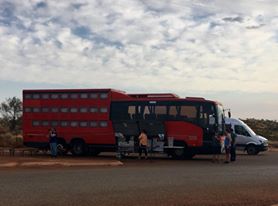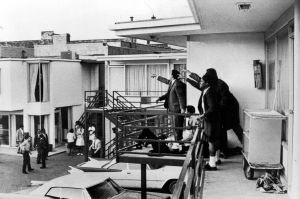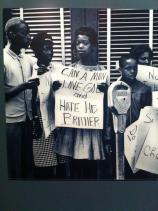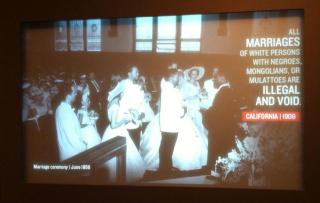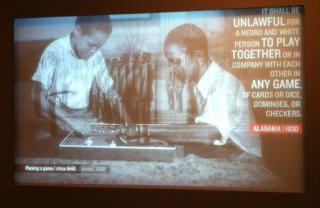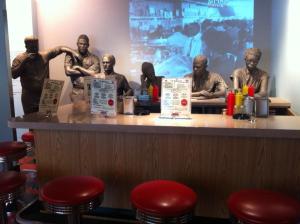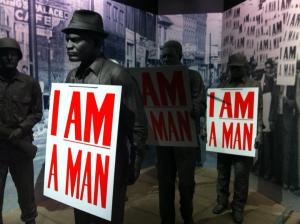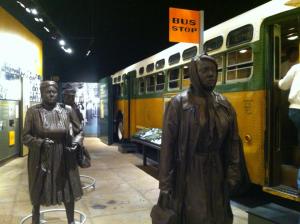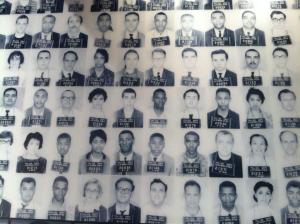In real time, Happy Thanksgiving, if you are American. Happy Thursday, if you are not. I have some news items to share at the end of this post.
—
Day four in Australia. Day four?! It felt like I’d been here forever, in a good way.
We alighted from our bus for sunset viewing of Ularu. I walked around snapping photos of other tourist vehicles. I have spent many hours in these heavy-duty Toyotas in Kenya and Ethiopia.
There was this crazy sardine-mobile, some kind of motel on wheels. I’m all for budget accommodations, but this beat even the bunkhouse for the claustrophobia factor.
There was this dusty, Mad Max BMW motorcycle.
A group of barefoot Aboriginal women sat on the pavement selling paintings. I felt a sharp, uncomfortable contrast as Meg poured sparkling wine.
But then I was distracted by food. “This is kangaroo jerky,” she indicated, “this one’s emu pâté and this here’s croc dip.”
“The kangaroo is delicious!” I commented. “It’s like venison.”
Heidi didn’t touch it. “I can’t eat it. The kangaroo and the emu—they’re our national animals.”
“They’re animals that can only go forward,” explained Heidi. “Like our country, I reckon is the idea?”
“I guess I wouldn’t want to eat a bald eagle,” I replied. Well, all the more emu and kangaroo for me!
The members of our group began introducing ourselves. Trevor and Gwen had immigrated to Australia from Nottingham, England, 20 years ago. They were here with their 14-year-old daughter, Tiffany. Kris and Melanie, a young Swiss couple, never spoke unless spoken to, so I didn’t get to know them at all. Brenden and Stefanie were another young couple, from Canada. Johannes and Sandra were a middle-aged German couple who took elaborate tripod-assisted selfies of themselves jumping for joy in front of every landmark. Mia and Nora were also German; both were around 22 and they were student teachers in a German school in Melbourne. There was a Chinese couple—father and daughter? Lovers? They stood apart and avoided all eye contact. Another couple, Darren and Kylie, were also a May-December pair. They said their names and that they were from Melbourne, then also kept to themselves.
I spoke with James, a 30-something Korean guy who spoke confident but almost-impossible-to-understand English. He was an out-of-work cook from Adelaide, blowing all his savings on a last hurrah in Australia before going home to an uncertain future. He reminded me of Vince. Because he was a cook, but mostly because there was a soulfulness about him.
—
Thanksgiving is my favorite holiday because it doesn’t involve decorating the house inside and out, buying presents, or any Christmas/Hanuka dilemmas. You just eat a lot with your family or friends, then fall asleep in front of the TV watching The Hobbit for the millionth time.
Thanksgiving is about—as the name implies—giving thanks, and I have a lot to be grateful for this year. As I sit here at my writing desk and look out the window at the grey sky and freezing drizzle, I am grateful for a warm home. I am healthy. I have friends and family. I got to spend a month in Australia! I wish I was there now.
And, some big news: I quit my job last week. More on that later, but I already feel 10 years younger.
And another big development: Vince and I started this blog together four years ago. We just published the first year of the blog as an e-book. It chronicles his time in prison, his recovery, and my ride along with him.
Besides providing insight into why people turn out the way they are, we’ve been told by many readers that it’s just a good read, a page turner. So if you’re looking for something to binge read over the weekend, or holidays, consider buying a copy. Only $3.99!
Breaking Free: A Mother And Son Journey From Addiction, To Prison, To Redemption https://www.amazon.com/…/B…/ref=cm_sw_r_cp_apa_AbI9Bb9K1SXQM
Please feel free to share this on social media, and thanks for reading—we know it can be difficult stuff but addiction and all its consequences, including imprisonment, are a reality for hundreds of thousands of people every day.

